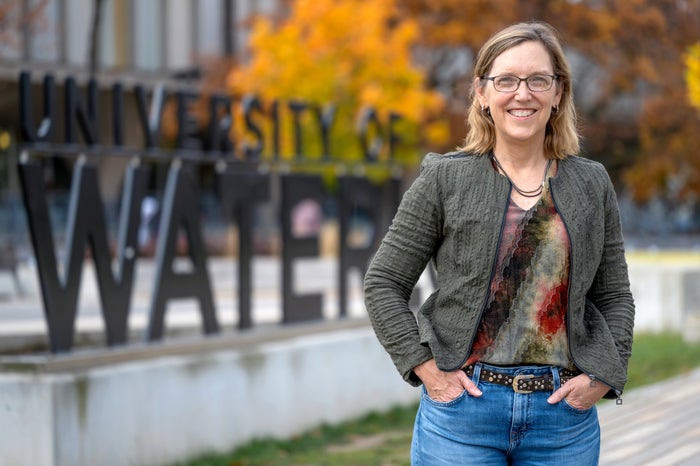Congratulations to Joanne Atlee, professor of computer science, who was named one of Canada’s Most Powerful Women today by the Women’s Executive Network (WXN).
Atlee is one of 100 recipients of the award, which recognizes women who “personify what it means to be powerful through the way they empower and champion others.” Atlee was recognized for the award for her foundational work in software engineering and her tireless advocacy for women in computer science.

Atlee has been a professor at the University of Waterloo since 1992. “The time here has been amazing,” she says. She especially appreciates the fact that academia allows her to pursue multiple interests and kinds of work. “One of the things that is truly unbelievable as a professor and faculty member is the ability to kind of change your career over the course of your time. So I’ve been able to focus on research, or on teaching, or on administration, throughout the years.”
With respect to her research, Atlee is best known for her work on software modelling and analysis for the purposes of error detection. Of particular interest are “feature interactions,” which are design errors that arise when a large software system is decomposed into components (or features) that are developed by different teams working mostly independently of one other. Problems emerge when the teams try to combine the components into a coherent system, but the components interact with each other in surprising ways. Atlee’s work in this area includes notations for modelling software components, operations for integrating components into a model of the system, and tools for automatically analysing the models.
Atlee was the founding director of Waterloo’s Software Engineering program, which was established in 2000. The program was an early interdisciplinary program (jointly run by the Faculty of Math and the Faculty of Engineering), and its founding required building consensus among the professors and administrators about the content of the program, admission requirements, the rules for progressing through the program – even the colour of the hoods at convocation.
Through the years, Atlee has also seen major social changes in her field – for better and for worse. “When I was an undergraduate in the early 1980s, around 35% of the students in Computer Science were women,” she recalls. “By the time I started teaching at Waterloo, less than a decade later, that number had dropped to about 10%.”
As a young professor, Atlee faced skepticism from many of her students, mostly men, who weren’t accustomed to a woman professor teaching systems-based computer science courses. When she became involved in efforts to support women in computer science, alumnae would reach out and share their experiences in the workplace. “They didn’t have networks, and they felt isolated,” she says. Many women would end up leaving the field after a series of bad experiences where they felt completely alone.
The Women in Computer Science (WiCS) committee was founded in 2007, and Atlee served as the Director from 2015 to 2018 and from 2020 to the present. The purpose of the organization, she says, is to create spaces for professional development and mentoring for women students in computer science. Much of the emphasis is on encouraging women to establish their own personal networks of technical women. “Being able to vet your experiences with others, seek support, and share advice is so important,” she says. “Having a network is the key to having the resilience to deal with difficult situations.”
Atlee is also responsible for bringing the Technovation program to Waterloo in 2018. Technovation is a worldwide program where girls ages 8 to 18 learn about entrepreneurship and tech in tandem. It provides a wholistic introduction to computing that focuses on how technology can be used to improve the world, Atlee says. “The girls join for the entrepreneurial experience, and through the program the learn to code a mobile app.”
There is still a great deal of progress to be made, however. At Waterloo, Atlee says, the representation of women in computer science is just above 25% -- still lower than it was when she was a student in the 1980s. The numbers continue to improve, and she has faith that strong role models, mentoring, and community building will help to close the gap.
Atlee’s own career is evidence of the power of that belief. While she has had many great mentors and coworkers for whom she is grateful, she says, first and foremost she owes her career path to her mother. “She insisted that I go into computing and made me take my first programming class. I fell in love with the discipline from there,” she recalls. “She knew what I could do.”
You can learn more about the full list of Most Powerful Women by reading the press release from WXN.